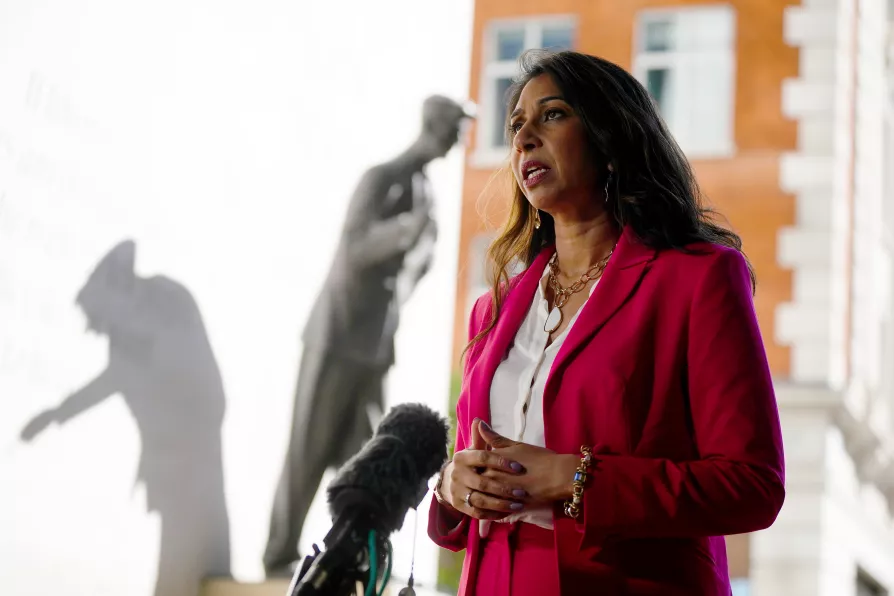
 Former home secretary Suella Braverman speaking to the media outside BBC Broadcasting House in London, May 5, 2024
Former home secretary Suella Braverman speaking to the media outside BBC Broadcasting House in London, May 5, 2024
LIKE poisonous porcupines intent on mating, key figures on the British political right are lumbering awkwardly towards each other, preparing for a post-election coupling.
The common assumption binding together Nigel Farage and Suella Braverman is that the upcoming election is lost for the hard right. The Tories are heading for an election calamity, and the only question is how disastrous it will prove to be.
But Farage’s Reform party cannot realistically expect to win more than a small handful of seats, however well it polls overall.
So the elaborate mating dance is really about who will call the shots in an oppositional regroupment after July 4, and who will be the surviving party.
The two sides agree, however, that they are aiming for the same political objectives and have thoroughly congruent agendas.
“Come to us,” coos Braverman and her ally Jacob Rees-Mogg, whose velvet-glove aristocratic manners conceals an iron-fisted free-market and culture-war agenda. They believe Farage should join the Tories and bring his troops with him, even including those who think fighting Hitler was a mistake.
Given the right-wing propensity of the Tory Party membership, who retain the final say over choosing the leader — they gave us Liz Truss, remember — the sky would be the limit for Farage under those circumstances, always providing he prevails in his bid to represent Clacton in the Commons.
“No, make your home in Reform,” the Brexit lothario responds. He urges, by name, Suella Braverman and the law-breaking, Israel-loving, leadership-fancying rightwinger Robert Jenrick to come over.
Farage believes — or affects to — that the Tories are finished for good and that Reform is the right’s vehicle of the future.
For Morning Star readers, who comes out winner in this coy exchange of endearments is a matter of distinctly secondary importance.
What is significant is that the right in Britain is repurposing along the lines of the nationalist-populist authoritarians presently performing all too well across Europe.
We can be sure that Farage and Braverman, when not making eyes at each other, are casting envious glances at Giorgia Meloni’s success in Italy, Marine Le Pen’s ascendancy in France, Geert Wilders king-maker role in the Netherlands, and even the increasing vote of the SS apologists of the AfD in Germany.
There is little reason to believe that such views are less popular in Britain than elsewhere. The same factors, including the dislocation caused by capitalist globalisation, anger at elites and cynically stimulated fears about migration and culture are at work here.
The British electoral system, however, constitutes a barrier of sorts. The Tories and reform cannot both rack up votes and then form a parliamentary alliance thereafter. They simply cannibalise each other’s support at the expense of either winning seats.
That is not a defence of first past the post, which is objectionable on other grounds. But it does condition the dialogue within the hard right. They must consolidate on one plan or the other — a newly energised Reform or a Tory Party shedding its liberal elements and going all-in for British Trumpism.
The danger is that whichever route the right eventually goes down it will become more authoritarian, more aggressively nationalistic and more pseudo-populist, without breaking with either Atlanticist imperialism or Treasury neoliberalism.
And this menacing hard right will confront a Starmer government utterly incapable of solving the problems facing society. It would be wrong to assume that a Braverman-Farage lash-up could not under any circumstances win an election, the intense opposition it would arouse notwithstanding.
Such a victorious regime would start an assault on our rights immediately. Do-nothing centrism will offer no protection. We can see the imminent barbarism, we need the socialist alternative.














